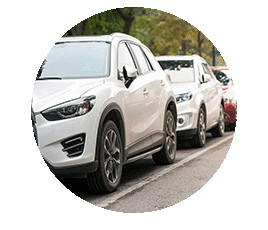If you are interested in buying a car, you're probably wondering: How much does a car cost in Canada? After all, owning a car is extremely useful for getting around but comes with several ongoing costs. Today, the team at Insurdinary is here to explain the cost of owning a car., including upfront costs and ongoing costs.
Average Car Price in Canada
The average manufacturer-suggested retail price (MSRP) for a new car in Canada is approximately $45,000. However, this number is just an average, and actual car costs differ depending on the car's make and model, your location, and current market conditions. For instance, a luxury BMW will cost substantially more than an economy-class Toyota Corolla.
The upshot is that most people don't end up paying the full MSRP for a new car. Most dealerships are willing to negotiate prices, and you could feasibly knock off a few thousand dollars before you even drive the car off the lot.
The average cost for a used car in Canada is approximately $33,000. Like other figures, this number is an average and can differ depending on the province, car model, and other market factors.
Buying a New Car vs Used
Most people shopping for a car encounter the question: new or used? Many people appreciate new cars because they have a fresh off-the-factory-line feel and are less likely to break down. Many new cars also have useful tech features like cameras, infotainment screens, and Bluetooth/WiFi connectivity.
On the other hand, used cars cost significantly less, have lower insurance and registration costs, and retain their value better than new cars. The typical new car loses an estimated 10% of its value as soon as you drive it off the lot. Used cars, in comparison, face less depreciation.
Used cars have some risks, such as hidden problems and warranty issues. However, you can mitigate the risk by buying from a reputable dealership and getting a professional inspection from a certified mechanic before purchasing.
Get the Best Online Loans in Canada
Secure the funds you need to purchase your vehicle.
We Can HelpBreakdown of Car Ownership Costs in Canada
The question, "How much does a car cost in Canada?" doesn't just include the car's sticker price. Owning a car also comes with several ongoing weekly or monthly costs. According to the BMO Auto Report, the average Canadian spends about $438 on their car every month.
Fuel
The most obvious cost of owning a car is fuel. Gas prices are higher than ever lately, so fuel costs will most likely take a large chunk out of your monthly car budget. The typical Canadian spent about 4% of their annual income on gas prices in 2021, and gas prices have risen since then.
Assuming an average fuel cost of $1.86 and assuming you fill a 45-litre tank three times a month, that comes out to nearly $250 a month spent on fuel. The amount you spend on fuel depends on how often you use your car and changes in fuel prices.
Financing
Unless you have enough cash to buy your car outright, you'll need to get an auto loan to finance the purchase. Monthly loan payments depend on the car's purchase price, the length of the loan, and interest rates. The typical auto loan in Canada has between 4% and 10% interest, and most loans are between three and six years.
For example, if you got a five-year $25,000 loan with a fixed 6% interest rate, you would pay approximately $430 a month for the loan. A six-year loan with the same terms would cost about $375 a month.
You can get a longer loan term to reduce your monthly payments, but you'll be paying more in interest over the loan term.
Insurance
Canadian law requires all drivers to carry car insurance. The average Canadian spends about $125 a month. Obviously, these costs vary based on the kind of car you have, your driving history, and the province where you live.
You can get government car insurance policies in some provinces, while other provinces allow private insurance schemes. British Columbia has the highest insurance cost per province, while Quebec has the lowest. When it comes to car insurance, mandatory one-way collision is the minimum requirement. However what car insurance normally covers can vary depending on your policy premiums.
Maintenance and Repairs
No matter what kind of car you buy, you'll eventually need maintenance and repairs. Car parts wear out, fluids need replacing, and you can damage your car in accidents. Maintenance and repair costs vary considerably and depend on the kind of car you have. For instance, a luxury vehicle like an Audi or Mercedes will likely have higher maintenance costs than a Honda.
Most Canadians spend an average of $120 a month on maintenance and repair costs for their cars. One way you can estimate annual costs for maintenance and repairs at 3% to 4% of the car's purchase price. If you spend $30,000 on your car, you can expect to spend around $900 to $1,200 on annual maintenance costs. While the $120 per month estimate on maintenance costs may not occur every month, when it is divided up, it's wise to consider your income and other monthly expenses in order to be able to budget for potentially larger repairs.
License Fees
Canadians must renew their car's registration each year. Registration costs mostly depend on your province. Annual registration in Ontario costs $60. Most provinces allow you to pay multiple years of registration at once.
Registration fees are usually one of the smaller components of a car budget but can still add up over time. Don't neglect factoring license and registration costs into your budgeting activity. Licensing fees in other provinces are as follows:
- Alberta - $84.45 per year
- British Columbia - $$18 registration fee and $46 licensing fee
- Manitoba - $139 per year
- New Brunswick - $61 to $189 (done by weight and range)
- Newfoundland and Labrador - $13.20 registration fee and $80.15
- Nova Scotia - $13.20 registration fee and $80.15 licensing fee
- Prince Edward Island - $100
- Quebec - $200.43
- Saskatchewan - varies each year and is determined by model and make of the vehicle
Parking
If you work near or in a city, you'll probably have to pay for parking at least a few times a week. Parking costs vary considerably, with cities like Vancouver having very high parking fees. If you live in a residential area, you can apply for a parking permit so you won't have to pay to park your car on the street outside of your residence.
Car Washes
Many people just wash their cars at home, but some prefer the convenience of regular professional car cleaning. A typical full-service car wash can range from $15 to $40.
How to Reduce the Cost of Owning a Car?
Car expenses can take up a significant chunk of the average Canadian's budget. Below are some tips on how you can save money on car costs.
Take the Bus
Gas prices are higher than ever, so consider taking the bus or train to work a few days a week if you can. Public transportation can cut your gas and maintenance bills by reducing wear and tear on your vehicle. Public transportation also produces fewer emissions, so you can feel good about being environmentally conscious.
Focus on Mileage
When it comes to cars, bigger isn't always better. A big SUV might look cool, but think of how much you'll spend at the pump every week. Smaller, more fuel-efficient cars might not look as flashy, but your wallet will appreciate the difference. Also, smaller, economy-brand cars usually have much lower insurance and maintenance costs.
Compare Car Insurance Products
Don't just go with the first insurance quote you find that looks good. Comparing rates from several providers will help you get the best policies. Also take a good look at your existing policy. Are there any good driving or low mileage discounts? How about more affordable premiums if you have winter tires? Understanding and questioning your existing policy can go along way to saving you money.
Stick to the Maintenance Schedule
You can save a significant amount of money on repair costs by sticking to a regular maintenance schedule. Cars require an oil change every 3,000 to 5,000 miles and a general maintenance tune-up every 10,000 miles or once a year, whichever is first. Regular maintenance ensures your car lasts longer and can prevent breakdowns and expensive repairs in the future.
Pay a Larger Down Payment
The larger your car loan, the more you'll have to pay in interest, especially if you take a long time to pay it off. Just like with a mortgage, you can reduce the amount you need to finance by placing a larger down payment. The larger the down payment, the faster you'll be able to pay off the loan and own the car outright.
Car Ownership FAQs
Below are some of the most common questions Canadians have about the cost of buying a car.
Generally speaking, the best time to buy a car is during the fall and winter or at the end of each month. Car dealerships want to clear as much merchandise before the term ends, so they often have discounts and other special deals at the end of the year or quarter.
Yes, you can trade your existing car and put that value towards the down payment. However, several factors determine the trade-in value of your current vehicle. If the trade-in is financed, the trade-in amount depends on the equity you have.
Although there are no explicit laws against it, most dealerships will not let you put the entire value of a used or new car on a credit card. However, some dealerships may allow you to pay the initial down payment using a card. Putting a down payment on a credit card can help you build credit if you pay off the credit card balance in full each month.
You can buy a car from a manufacturer, but most manufacturers will still use a dealer to facilitate the transaction. If you call a manufacturer and request a specific car model they do not have, they can broker a transaction between the factory and you.
It depends on your financial situation and personal preferences. Used cars are usually cheaper and have lower insurance costs, but many people prefer the new-car look and feel. New cars also tend to have stronger warranty policies.
To Lease or Not to Lease a Car
Let's dive a little deeper on whether or not to lease a vehicle.
Read On HereCompare Car Loans from Top Canadian Providers
Now that you know the answer to "How much does a car cost in Canada?", it's time to take the next step. At Insurdinary, we strive to make shopping for car loans and auto insurance policies as simple as possible. You can use our lookup tool to find and compare rates from the top providers in the country.
Contact us to learn more, or fill out our form to receive a quote today!





